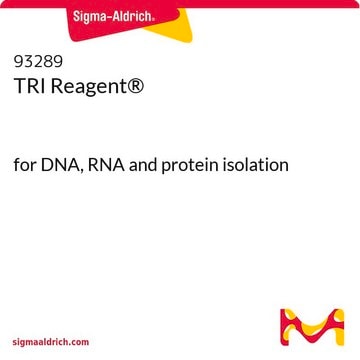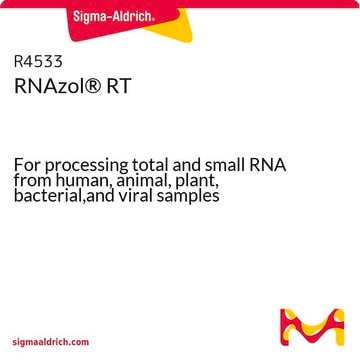B9673
1-Bromo-3-chloropropane
for isolation of RNA
Synonyme(s) :
Chlorure bromure de triméthylène, I-BCP
About This Item
Produits recommandés
Qualité
for molecular biology
Niveau de qualité
Pureté
≥98.5% (GC)
Forme
liquid
Indice de réfraction
n20/D 1.486 (lit.)
Point d'ébullition
144-145 °C (lit.)
Densité
1.592 g/mL at 25 °C (lit.)
Température de stockage
room temp
Chaîne SMILES
ClCCCBr
InChI
1S/C3H6BrCl/c4-2-1-3-5/h1-3H2
Clé InChI
MFESCIUQSIBMSM-UHFFFAOYSA-N
Vous recherchez des produits similaires ? Visite Guide de comparaison des produits
Description générale
Application
- feline teeth
- mice brain and liver tissues
- human ectocervical epithelial cells
- placental samples
- human mesenchymal stromal cells (hMSCs)
Caractéristiques et avantages
- less toxic alternative to chloroform
- compatible with TRI reagent for isolation of RNA with decreased DNA contamination
Autres remarques
Produit(s) apparenté(s)
Mention d'avertissement
Danger
Mentions de danger
Conseils de prudence
Classification des risques
Acute Tox. 3 Inhalation - Acute Tox. 4 Oral - Aquatic Chronic 3 - Muta. 2 - STOT SE 3
Organes cibles
Respiratory system
Code de la classe de stockage
6.1C - Combustible acute toxic Cat.3 / toxic compounds or compounds which causing chronic effects
Classe de danger pour l'eau (WGK)
WGK 2
Équipement de protection individuelle
Eyeshields, Faceshields, Gloves, type ABEK (EN14387) respirator filter
Certificats d'analyse (COA)
Recherchez un Certificats d'analyse (COA) en saisissant le numéro de lot du produit. Les numéros de lot figurent sur l'étiquette du produit après les mots "Lot" ou "Batch".
Déjà en possession de ce produit ?
Retrouvez la documentation relative aux produits que vous avez récemment achetés dans la Bibliothèque de documents.
Les clients ont également consulté
Protocoles
TRI Reagent enables simultaneous DNA, RNA, and protein isolation with sample prep guidelines and troubleshooting.
TRI Reagent enables simultaneous DNA, RNA, and protein isolation with sample prep guidelines and troubleshooting.
TRI Reagent enables simultaneous DNA, RNA, and protein isolation with sample prep guidelines and troubleshooting.
TRI Reagent enables simultaneous DNA, RNA, and protein isolation with sample prep guidelines and troubleshooting.
Notre équipe de scientifiques dispose d'une expérience dans tous les secteurs de la recherche, notamment en sciences de la vie, science des matériaux, synthèse chimique, chromatographie, analyse et dans de nombreux autres domaines..
Contacter notre Service technique












